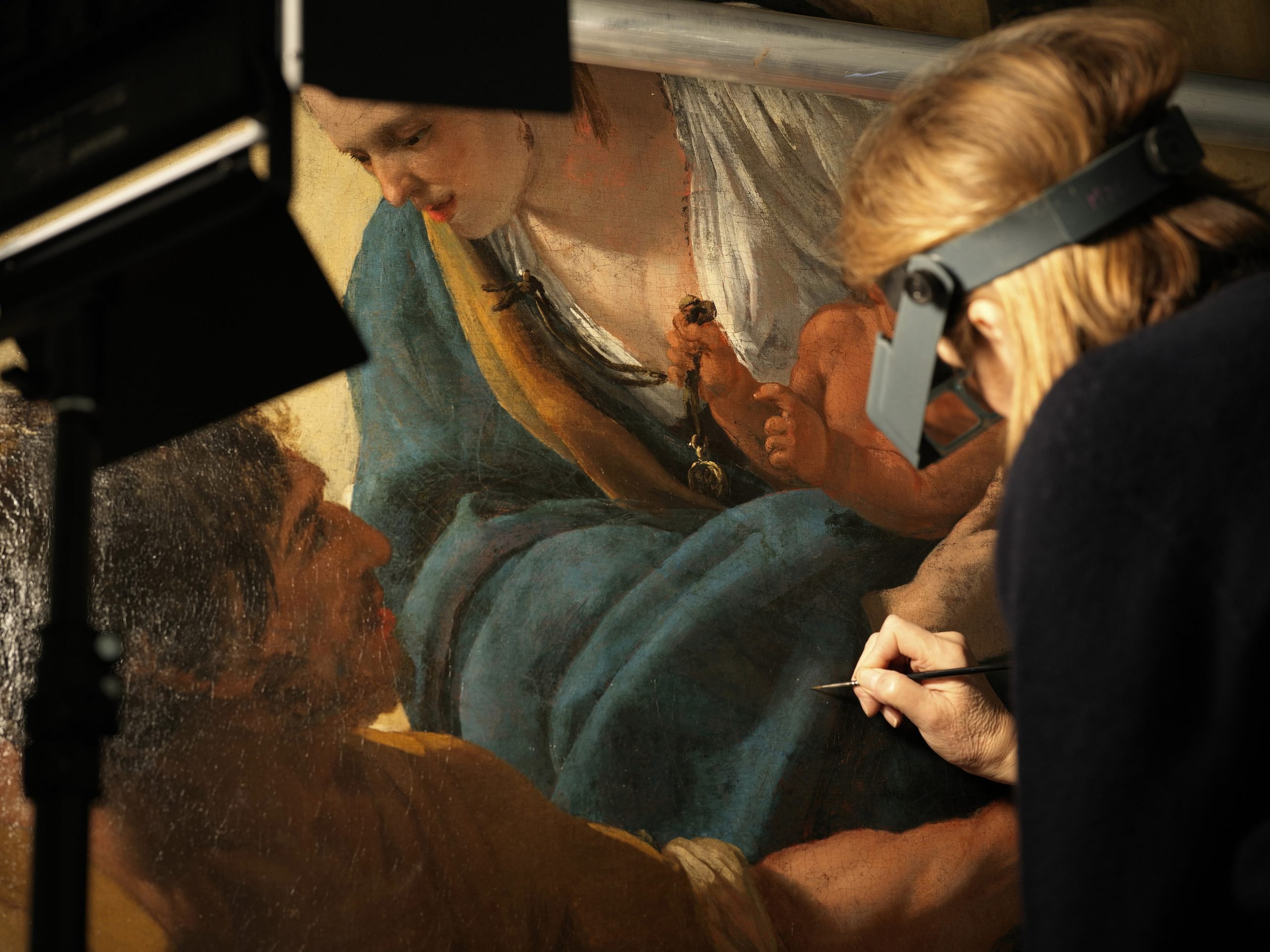
When the Notre-Dame de Paris caught fire on April 19, 2019, there was a terrifying half hour window in which it seemed the cathedral might collapse. The world watched agape as the spire toppled and smoke billowed out across the Parisian skyline. The smarts and daring of firefighters proved decisive. By midnight, the authorities would declare “she is saved” and a human chain led out of the smoldering building, carrying artworks, relics, and valuable books to safety.
On the five-year anniversary of the blaze, an exhibition featuring many of the rescued works will go on display at Mobilier National in Paris, the home of France’s furniture collection. As suggested by the title, “Restoring the Grand Decors of Notre Dame,” the exhibition showcases the technical expertise of those who have meticulously restored the building’s paintings, tapestries, and carpets.
“Since the fire of 2019, nearly 1,000 craftsmen have worked daily to restore the cathedral, among them are painting restorers,” Mobilier National said. “[Alongside the paintings,] sketches, drawings, and multimedia will be used to show the exceptional know-how of heritage restorers.”
Laurent de La Hyre, Saint Peter Healing the Sick with His Shadow. Photo: Mobilier National.
Among the 21 paintings shown at Mobilier National are 13 prized religious works from the 17th century, known as the Mays, so named for the month in which Paris’s goldsmith guild presented them to the cathedral. Created to express renewed Catholic faith in the wake of a devastating series of wars between Catholics and Protestants in the final decades of the 16th century, the Mays employed the country’s finest painters, typically to depict the acts of the apostles.
The Mays themselves have endured a wandering history of mixed fortunes. Beginning in 1630, they were hanged on the stone pillars alongside the nave before being scattered during the tumult of the French Revolution. Returned in 1802, they were deemed incongruous with Notre-Dame’s redevelopment of the 1860s and sent to the Louvre where they remained until 1905. Of the 76 Mays painted, the whereabouts of 52 are known.
Charles Le Brun, The Martyrdom of St. Andrew (1646). Photo: Mobilier National.
Though undamaged by the fire, the Regional Direction of Cultural Affairs (DRAC) chose to perform long overdue restorations, hiring 50 restorers over a 24-month period for the task. At Mobilier National, the Mays are presented chronologically—the diocese has a new layout planned for Notre-Dame—and are granted long overdue attention.
We meet Laurent de la Hyre’s Saint Peter, who wanders head bent and palm upturned through a scene of delirious sickness. We see Charles Le Brun’s Andrew, a man naked before God moments before he’s set upon by soldiers. The dense, dark work was Le Brun’s first following training in Rome and do much to burnish his reputation. We watch Nicolas Loir’s crimson robed Paul calmly blind a magician before the Cypriot Proconsul.
Nicolas Loir, Saint Paul Blinds the False Prophet Barjesu (1650). Photo: Mobilier National.
Also of note is the one ton, nearly 90-foot long choir carpet that was commissioned by King Charles X in 1825 and designed to mimic a Gothic stained-glass window. Barring major events (such as the marriage of Napoleon III or the visit of Pope John Paul II), it is rarely displayed with only the upper half on display here—the lower is still being restored and fitted with a protective braid.
Mobilier National will also present 14 tapestries that depict the life of the Virgin Mary, which were commissioned by Cardinal Richelieu in the mid-17th century. Created to decorate Notre-Dame’s choir, the cathedral sold them to Strasbourg cathedral in 1739.
A cathedral chair designed by Ionna Vautrin. Photo: Philippe Migea.
A slightly more modern turn comes in the exhibition’s final section that shows examples of the new liturgical furniture that have been designed by Ionna Vautrin and manufactured by Bosc, a based in Landes, France.
Notre Dame is due to reopen on 8 December, 2024, following restoration costs approaching $1 billion.
“Restoring the Grand Decors of Notre Dame” is on view at the Mobilier National, Galerie des Gobelins, 42 avenue des Gobelins, Paris, France, April 24– July 21.